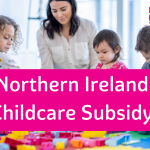Childcare can play a key role in tackling disadvantage – but must be invested in as critical economic and societal infrastructure
Early learning and childcare is key to lifting families out of poverty and giving children the best start in life, but, at present, the system in Northern Ireland is letting families down and not achieving its potential to tackle disadvantage. Our proposals put tackling disadvantage at the heart of a childcare system that works not just for parents, but improves our economy, our communities and our society as a whole.
The childcare system in Northern Ireland has reached a breaking point – for parents and for early learning and childcare providers. Early learning and childcare is not affordable for families. The last Northern Ireland Childcare Survey (2023) found the cost of a full-time childcare place is now over £10,000 per year – for 41% of families, childcare is their largest monthly outgoing ahead of their mortgage or rent. For some families, paying for childcare is leading to household debt, with 56% using means other than their income to pay for childcare, including savings, credit cards and loans.
While UK-wide support is available for eligible parents, and children can benefit from an allocation of funded pre-school provision in their immediate pre-school year, this is not enough. The system of support is complex and, for many households, the unaffordability of childcare is leaving parents questioning whether they can afford to work – particularly when their children are very young. Parents are reducing their working hours, passing up on opportunities for career progression and in some cases leaving work altogether because of difficulties affording or accessing childcare. Parents in lower income households are more likely to have had to stop work due to the cost of childcare – more than three quarters (76%) are likely or very likely to change their working arrangements due to childcare.
Childcare providers are also contending with rising costs with a recent poll conducted by Employers For Childcare finding almost half of childcare providers (46%) described their financial situation as “struggling” or “distressed” indicating the precarious state of the sector, which is so critical to our economy and society. High staff turnover and recruitment and retention challenges across the sector impact the quality of provision as it is increasingly difficult to secure and progress skilled staff. Low pay is a major problem across the sector.
There is no sufficiency duty requiring the government to ensure there are sufficient childcare places to appropriately meet the needs of all families, including those who have a child with a disability. Families face a range of barriers to accessing quality early learning and childcare with 81% saying there is not enough provision of childcare in their area.
Research shows that lower-income families (household incomes under £30k) are least likely to benefit from quality childcare, reducing household incomes as a result of working fewer hours or stopping work altogether. Disadvantaged children are therefore missing the benefits of quality provision.
Recommendations to tackle disadvantage through early learning and childcare
With work ongoing on a new Early Learning and Childcare Strategy, there is a generationally significant opportunity within Northern Ireland to design and invest in a new model of integrated early education and childcare.
Northern Ireland requires a bespoke funding model for the sector to better meet the needs of all families but with a focus on disadvantaged children. While the recent announcement by the Education Minister of a package of support for early learning and childcare, including a new Northern Ireland Childcare Subsidy scheme, is a welcome interim measure, it is initially focused only on supporting eligible working parents of children under school age. The detail of how the scheme will be rolled out and further information around eligibility, is still to be confirmed.
We need to go much further to achieve the potential of childcare in tackling disadvantage and delivering a thriving, prosperous economy that benefits everyone across our society.
Employers For Childcare has developed proposals that deliver broader support with childcare, including the following:
- The universal, free provision of 22.5 hours of early learning and childcare for children in their immediate pre-school year. This would benefit all families, including those who are disadvantaged, with no work or income-associated criteria for access.
- A core-funding subsidy for all registered childcare providers covering a portion of their costs of delivering quality early education and childcare, enabling them to reduce the fees they charge parents. The subsidy should be increased over time, and as public finances allow, further reducing fees for parents.
- A strengthening of the support aimed specifically at tackling disadvantage, including targeted subsidies for providers and expansion of Sure Start services.
Our proposals are published in a briefing we developed in partnership with the Joseph Rowntree Foundation. They are an initial suite of measures to be taken in the first half of a new 10-year Early Learning and Childcare Strategy. They are aimed at addressing the issues set out above without destabilising the sector or introducing unintended consequences that could work against the objective of tackling disadvantage.
For the second half of the new strategy, there will be a much stronger foundation on which to build a more responsive co-funding model, taking account of household income to determine what families pay for their childcare bill on the basis of what is affordable to them. For families in poverty, this will mean they are able to access an allocation of quality early learning and childcare that is fully funded.
Conclusion
Quality, affordable early education and childcare is a key tool in tackling disadvantage by enabling parents to work, helping to address child poverty, and through giving all children and young people the best start in life. This is essential in preventing disadvantaged children from falling behind before they even start school.
However, inadequate investment, and a lack of progress over many years, means that the system in Northern Ireland is failing parents, providers and children – and entrenching disadvantage. This cannot continue, and the new Executive must address this issue as a core priority, at the heart of a new Programme for Government, underpinned by the ambitious funding that is needed to deliver a world-leading early learning and childcare infrastructure.
It is heartening that childcare has emerged as a key issue since the re-establishment of the Executive. This is testament to the many years of hard work from across our sector in pushing childcare to the top of the agenda, and ensuring its role as an economic enabler and as a tool to combat poverty is recognised. But the job isn’t done. So if getting childcare right is really to be the legacy of this government, as has been indicated time and again, we need to see action now that goes beyond promises and plans to deliver meaningful – and long-term – change that leaves no one behind, and benefits everyone across our society.
This article was published on the Pivotal Public Policy Forum website on Wednesday 12 June 2024.






